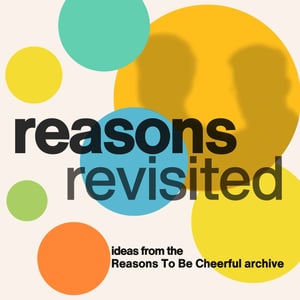Reasons Revisited: Parental Leave
Reasons Revisited
Geoff Lloyd
4.8 • 2.6K Ratings
🗓️ 13 October 2023
⏱️ 14 minutes
🧾️ Download transcript
Summary
The winner of the Nobel Prize in Economics was announced earlier this week. Claudia Goldin’s research showed that at the point of having a child women's wages start to lag behind men's. But why is parenthood a penalty for mothers? Could a more generous parental leave offer - including a ‘use it or lose it’ policy for fathers - be the key to achieving gender equality?
Guests
Sam Smethers, former CEO, Fawcett Society
Katrín Jakobsdóttir, Prime Minister of Iceland
Molly Mayer, former senior research and policy officer, Fawcett Society
Listen to RTBC episode 64 Sharing and Caring: the case for paternity leave (December 2018)
Listen to RTBC episode 194 Go Big #1: A big idea for gender equality (June 2021)
Learn more about the charity Pregnant then Screwed and their research that shows boosting paternity leave has economic benefits
Read about Claudia Goldin’s work and winning the 2023 Nobel Prize in Economics
We'll be back on Monday with our next full episode of Reasons to be Cheerful!
Hosted on Acast. See acast.com/privacy for more information.
Transcript
Click on a timestamp to play from that location
| 0:00.0 | This week the Nobel Prize in economics went to Claudia Golden for her research exploring women's participation in the labour market. |
| 0:07.2 | And we're asking, is better parental leave the fix to the gender pay gap? |
| 0:17.0 | Hello, I'm Jeff Lloyd, and this is Reasons Revisited. It's a weekly fun-sized reason to be cheerful. |
| 0:20.0 | We dig back into our five-year audio archive and brief you on a big idea that's having a moment. |
| 0:27.0 | In this episode we're talking about parental leave and how introducing better policies especially for fathers could |
| 0:34.4 | effectively reduce the gender pay gap. Here in the UK mothers receive six weeks of |
| 0:39.0 | pay at 90% of their salary after giving birth. |
| 0:41.4 | Fathers or partners only receive two weeks by of their |
| 0:43.2 | salary after giving birth. Fathers or partners only received two weeks by law and they paid |
| 0:45.9 | 172 pounds 48 per week which is the equivalent of less than half of the |
| 0:50.0 | national living wage. The introduction of shared parental leave in 2015 in the UK |
| 0:54.9 | was a step in the right direction, recognizing that the care of a child should be |
| 0:58.8 | shared between parents. However, the mother has to make the choice about whether they want to transfer leave to their partner, |
| 1:05.0 | rather than it being ring-fenced, use it or lose it, paternity leave. |
| 1:08.0 | And take-up of shared parental leave has been low. |
| 1:11.0 | Only 1% of mothers and 5% of fathers have taken it up, and those that |
| 1:15.6 | do a predominantly older work for larger organisations and earn more money. |
| 1:20.0 | But what would a better version of parental leave look like? |
| 1:22.8 | And could it reduce the gender pay gap and other work related disparities? |
| 1:26.7 | Here's the current picture. |
| 1:28.0 | The UK has the least generous parental leave rights in Europe. |
| 1:32.0 | While women can take up to 52 weeks away from work if they want to, |
... |
Please login to see the full transcript.
Disclaimer: The podcast and artwork embedded on this page are from Geoff Lloyd, and are the property of its owner and not affiliated with or endorsed by Tapesearch.
Generated transcripts are the property of Geoff Lloyd and are distributed freely under the Fair Use doctrine. Transcripts generated by Tapesearch are not guaranteed to be accurate.
Copyright © Tapesearch 2026.

